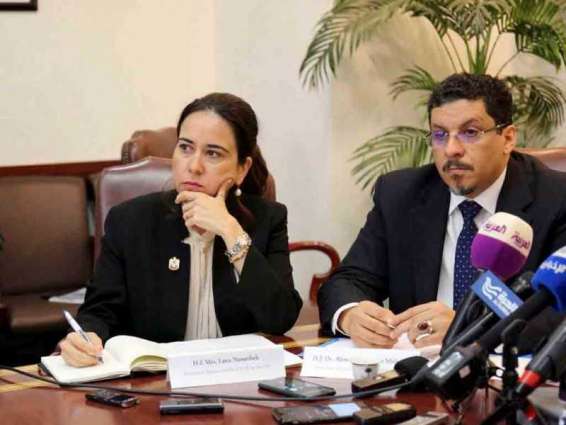(Pakistan Point News - 22nd Jun, 2018) NEW YORK, 21st June 2018 (WAM) - The United Arab Emirates is absolutely committed to maintaining and accelerating its cooperation and coordination with the United Nations and other international organisations to boost humanitarian relief and contingency planning in Yemen, said Ambassador Lana Zaki Nusseibeh, UAE's Permanent Representative to the United Nations in New York.
Ambassador Lana Nusseibeh made the remarks while addressing a press briefing, with UN-based correspondents hosted at the Saudi Mission in New York by Ambassador Abdallah Yehya Al-Mouallimi, Saudi Permanent Representative to the UN, on Humanitarian Situation in Yemen.
Also in attendance were Ahmed Bin Mubarak, Head of Yemen’s UN Mission in New York and Sultan Al Shamsi, UAE’s Assistant Minister of Foreign Affairs an International Cooperation for International Development.
Following is the full text of Ambassador Nusseibeh’s statement: Colleagues, Ambassador Al-Mouallimi, Ambassador Ahmed, Thank you so much for the invitation to join you today, and for the opportunity to discuss humanitarian response and planning in Yemen.
We are very pleased with the significant progress that the United Nations and bilateral donors have made in recent months – marking a turn-around from even a few months ago.
However, we recognize that the situation in Hodeida is justly of huge concern. It is therefore important to have a common understanding of the mechanics of humanitarian relief and contingency planning in Yemen, and also to connect Hodeida to the broader humanitarian situation, as well as to the UAE and the Coalition’s commitment to international humanitarian law and the humanitarian principles of humanity, neutrality, impartiality, and independence.
As Ambassador Al-Mouallimi said, the Coalition has made humanitarian relief a priority since the Houthis instigated this conflict against the Yemeni government in 2015. The UAE has contributed nearly $4 billion of aid since April 2015, covering a number of sectors, from emergency food provision to water to electricity to education to social services, and to other critical areas. Local and international NGOs are key implementing partners and funding recipients, and the aid is designed to address the unique needs of women, girls, boys, and men.
We believe that the $465 million contribution we made earlier this year through the UN for the Yemen Humanitarian Response Plan is a new, landmark chapter for humanitarian assistance to Yemen.
This funding is unrestricted and unconditional, allowing the UN to immediately act on its prioritized needs assessment, and reach the most vulnerable people across the country. It is an unprecedented vehicle for upholding humanitarian principles and for serving all Yemenis – regardless of their location and affiliation.
Thanks to this funding, the UN has already reported rapid progress on the ground. Mark Lowcock, the head of OCHA, yesterday presented a number of 2018 results from the Yemen Humanitarian Response Plan during the UN Economic and Social Council Humanitarian Affairs Segment.
He noted that the number of people the UN is reaching has more than doubled from 3 million per month to 7 million. Cholera treatment time has shrunk from 1 week to less than 24 hours. 2.3 million people have received medical treatment, and new water and sanitation services have reached 3.1 million people. The YHRP – by using the full UN system and working with more than 150 implementing partners – has shown how much can be achieved in a short period when the right funding and governance structures are in place.
We are absolutely committed to maintaining and accelerating this progress, and it’s here where I would like to touch on the Hodeida operation from the humanitarian angle.
There is no doubt that the port is a part Yemen’s critical infrastructure. Coalition and UN coordination has enabled approximately 30 ships to unload in the last month, nearly one per day, and this is continuing. Moreover, we have made a clear commitment to protecting and preserving the port and other key humanitarian infrastructure.
However, there are no such assurances from Houthi forces. We are encountering an enormous number of mines and IEDs, and it is believed that the port is also mined.
According to the UN, aid groups, media, civilian reports from the city and our own information, the Houthis are taking deliberate actions to create a humanitarian crisis and exacerbate the overall conflict. They are: - blocking the unloading of ships at Hodeida port; - forcing aid groups to remove surveillance cameras in warehouses, abetting the Houthi theft and diversion of food supplies; - destroying the water and sewage systems by deep digging to build berms for tanks and artillery placed in residential neighborhoods.
- Cutting off water and sewage significantly increases the likelihood of a cholera outbreak.
- indiscriminately placing land mines and IEDs along roads and in neighborhoods; - prepositioning sea mines and explosive devices around the port to destroy infrastructure; - placing snipers and heavy weapons in residential neighborhoods; - disguising themselves as resistance fighters and abusing civilians to generate resentment against the Coalition.
This is a huge concern. Our message here at the UN is that all parties need to commit to international humanitarian law and access, with a specific pledge to keep the port open and operational. It will be disastrous in humanitarian terms if the Houthis believe they can gain leverage in political negotiations by destroying the port.
The Houthis must not be rewarded by the international community if they decide to enact a scorched earth strategy designed to bring their own territory into ruin. Any Houthi actions against humanitarian infrastructure need to be condemned in the strongest possible terms.




